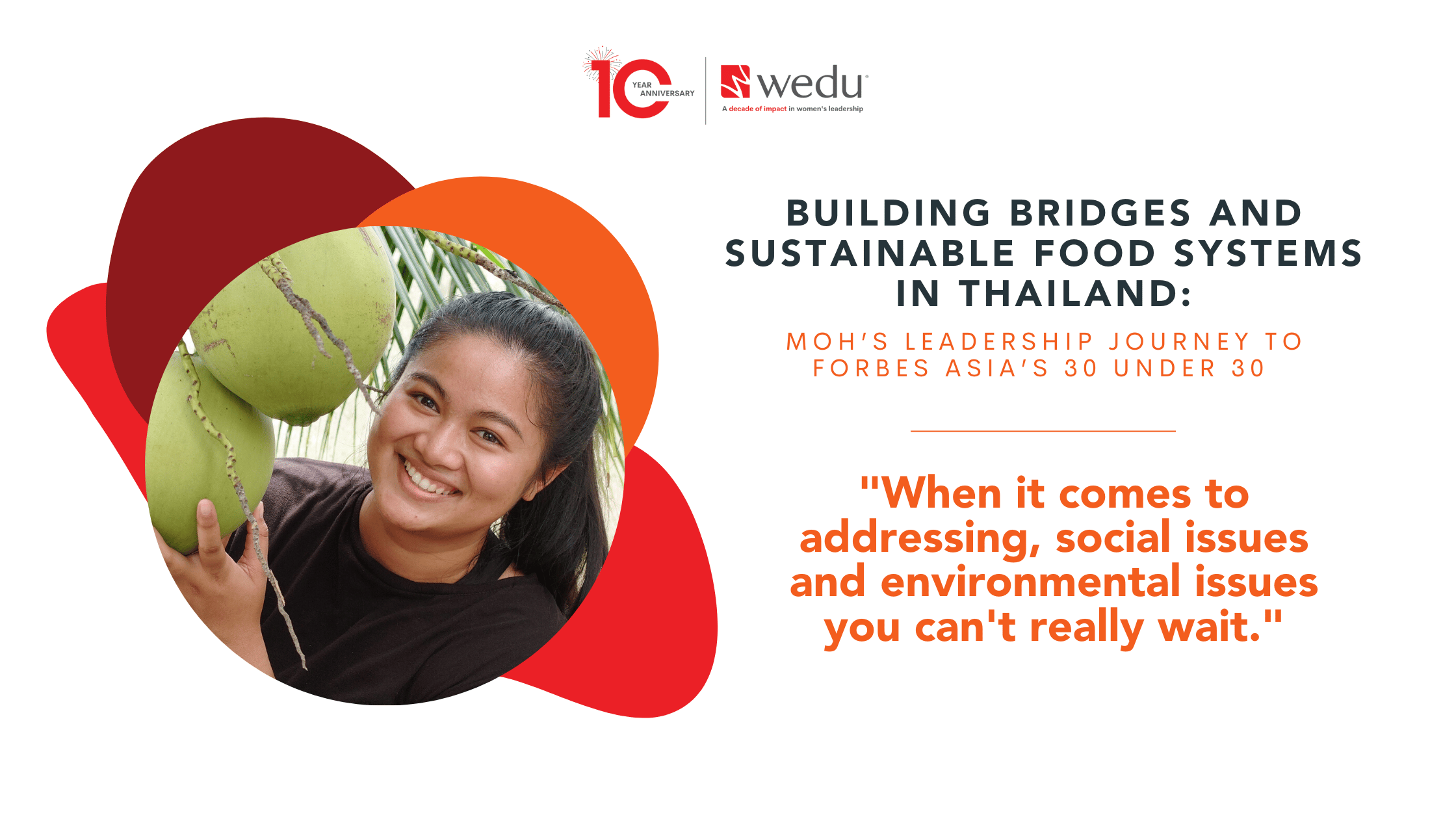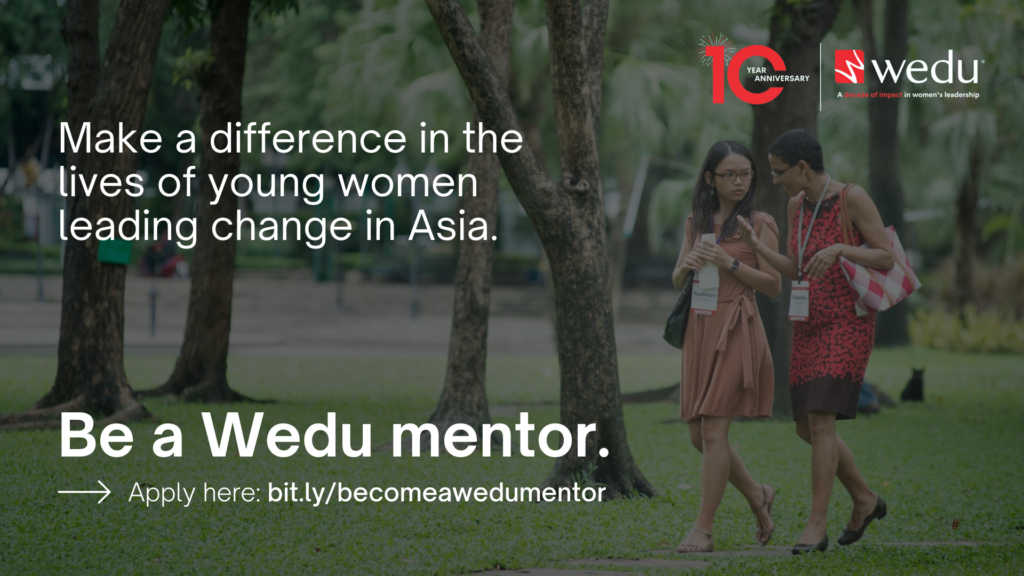
28 Jun Building Bridges and Sustainable Food Systems in Thailand: Moh’s Leadership Journey to Forbes Asia’s 30 under 30
 At Wedu, we invest in women leaders because we believe in the powerful role they play in leading change in their communities. Our Rising Stars are testimony to that and Suthasiny (Moh) Sudprasert is an example of a changemaker and leader that’s been able to not only support her community, but also Thailand’s rural agricultural sector.
At Wedu, we invest in women leaders because we believe in the powerful role they play in leading change in their communities. Our Rising Stars are testimony to that and Suthasiny (Moh) Sudprasert is an example of a changemaker and leader that’s been able to not only support her community, but also Thailand’s rural agricultural sector.
Based in Bangkok, Moh always had a passion for problem solving and development. These are some of the foundational values behind Happy Grocers, the social startup she co-founded with her best friend Pearl which aims to create a sustainable food system by connecting small local farmers and consumers looking for fresh produce and an eco-friendly grocery shopping experience. Two and a half years later, Moh, makes it onto the Forbes 30 under 30 lists in Social Impact.
As a Rising Star since 2017, she credits her leadership journey to communities, networks and the support of mentors. She shares her journey from joining Wedu in her first years at Thammasat University to her venture into agriculture at the start of COVID-19.
Support Systems
Moh’s mentorship journey began in her second year when she applied to several leadership programmes including the Rising Star programme and got accepted to most of them. She also mentions her easy relationship with her Wedu mentor, “it was just so easy to talk to him and he was super hands-on, whenever I wanted to learn more and just do research he would send me emails with all these resources.”
“And at the time that I became a Rising Star, it was also the time I actually kicked off the career that I wanted to pursue. My internship with MIT was all about using design thinking and creating a bridge between international practitioners and local farmers which is pretty much what I’m doing now. I just really got into social innovation, organizing workshops to help solve problems, and I did that quite a lot when I was a student cause I knew early that I prefer to learn that way and that’s something that I wanted to do when I graduate.”
A year later in 2018, she started working with an organization called DSIL (Designing for Social Innovation and Leadership) where she managed to grow her network and benefit from finding a Mentor. “There was this one mentor, where we just clicked and she’s been my mentor ever since- 2018.”
Building Bridges and Solving Problems During the Pandemic
In March 2020, the COVID-19 pandemic hit Thailand as it did in the rest of the world. Moh instantly saw a problem in the need for fresh produce within her community at a time when access was limited. “I’m into solving problems and trying to understand a holistic system or a specific problem and trying to find a tangible solution that may change in my lifetime. I’m friends on Facebook with farmers I met during my internship with MIT and other projects. I saw them complain that they couldn’t distribute their produces. At the same time, I also had colleagues who were international and were scared to go out cause of COVID-19 they wanted fresh produce with no plastic. So I thought ‘Ok, cool. Let’s connect them.’
It started with just one Facebook post and then people started to order, and people still order up till today which is cool. It’s not that I always knew I’d work in agriculture. But, because I care about poverty, it lead me to end up working in this industry. When over 10 million people in our country are farmers, it must be a significant issue that needs urgent change.”
Challenges and Lessons Learned
Having had past experience with startups, Moh still had more to learn in what she calls her first ‘legit’ business. She, however, pays tribute to her network, community and strong support system as the factors that allowed her to overcome those challenges and learn more. Sound like more reasons as to why we need to support women leaders!
She gave us three main lessons she learned in her first few months as the owner of a start-up.
Communication
To Moh, communication was one of her key learnings in her first year as a social entrepreneur. While Moh and Happy Grocers co-founder Pearl has been close friends since university, their business relationship felt just as seamless. Moh shares, “There were times I used to think about all the things we can do and all the dreams we could achieve and then sometimes I didn’t communicate that enough with my co-founder, so she didn’t know what exactly I wanted to do. And then I would think ‘oh, why is it that I put in so much work?”. But they learned how to move forward together, even in conflict. “[We realized] You can change that conflict into an opportunity for us to have clarity and then come up with a better strategy to deal with things around us.
Economies of Scale
Learning the in’s and out’s of business was also another crucial lesson. Even though what she was doing was for a good cause, she quickly realized that she still needed to be competitive and business savvy. “What I thought before is that ‘oh, because we are doing this for social impact, it’s an excuse for me to not be as competitive as big companies,’ but something I realized is that no matter how much people care about the environment, if your price is not reasonable for them or if you are not as efficient in your service or delivery people are eventually gonna choose those big companies that are perceived as evil anyway because they are so convenient.”
Community Marketing
A marketing budget was something that was the last thing on their list and but it ended up working out for them as they discovered the best and most underestimated marketing tool of them all. “Word of mouth”, it’s such an effective way to really build community and there’s something that differentiates us also from other brands. If you order Happy Grocers and the box comes into your house, you would know exactly where it comes from but if you order from somewhere else, it’s just a box, right? That’s how one of the customers put it. Don’t let the conventional strategies or industry tell you how you should do your work.”
Impact on all Levels
Although Happy Grocers hasn’t been around for long, they’ve been able to make an impact in the lives of their suppliers (the farmers), their customers, and the environment. “We’ve saved about 70 tons of food that looks ugly in the last two years. And we delivered 20,000 boxes of food, and we prevented about 700,000 pieces of plastic bags being used cause we use packaging like banana leaves and reusable glass jars.”
Moh says that two years is not long enough to make any life-changing impact on farmers’ life, however she shares a few stories from corn farmers in northern Thailand who became more economically empowered because of their initiative, “So they had only like a yearly income, but when they started to grow vegetables for us, they started to have a weekly income. That’s better for them to manage their finance for things like education or healthcare and take care of their families.”
Advice for Rising Stars in Social Entrepreneurship
Moh’s advice truly stems from being able to be driven and resourceful, regardless of barriers that may be in your way. “I think one myth that we kind of have, is that we need to wait until we are in the perfect time and situation in our life and have enough money to start something. Yes, If you have money it would be much easier, but many times when it comes to social issues and environmental issues you can’t really wait. So to do that without money, it’s very important to figure out a way that’s the most cost-effective that could prove that the market needs your solution”
The drive turns into credibility as she also mentions how much that can have an impact on how future investors view you and your mission. “After that, then people would see that, OK, this person wants to do this, although they don’t have the money to make this work. And it’s just so important because investors look at founders and not only look at ideas. Especially cause ideas can change anytime, but it’s the people who drive the ideas that they will look at.”
What’s Next?
Moh’s passion for innovation and disrupting the agricultural sector in Thailand has led to her new ideas for expanding Happy Grocers to a global scale. She talked about international trade that would benefit rural farmers as well as the possibility of carbon neutrality. Her excitement shines through as she looks toward the future of Happy Grocers. We can’t wait to see more of what Moh will do for not only her community but the agricultural industry!
Stories like Moh’s continue to fuel and shape our mission of advancing women’s leadership. Support more young women changemakers like Moh by giving at https://www.weduglobal.org/donations/wedudonate/ or become a mentor yourself and support our Rising Stars at https://www.weduglobal.org/mentor/.



Sorry, the comment form is closed at this time.